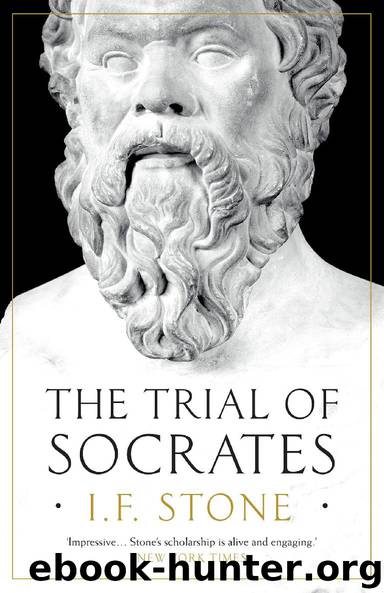The Trial of Socrates by I. F. Stone

Author:I. F. Stone [Stone, I. F.]
Language: eng
Format: epub
ISBN: 9781784970949
Publisher: Head of Zeus Ltd.
12
Xenophon, Plato, and the Three Earthquakes
Xenophon and Plato were in their teens when the dictatorship of the Four Hundred was established in 411 b.c., old enough to be politically aware but too young to take an active part either in the overthrow of the democracy or its restoration. When the dictatorship of the Thirty was set up seven years later, both were in their middle twenties, but there is no record of their participation on either side. So far as we know they did not leave the city with the democrats – that would have been unthinkable for young men of their aristocratic background. Neither is mentioned in connection with the events of 401. Xenophon left Athens that same year to take up service as an officer commanding mercenaries in the Persian army. He never returned to Athens again. “It was probably in 399 b.c., the year of Socrates’ death, and a time of difficulty for Socratic associates,” the Oxford Classical Dictionary says, “that Xenophon was formally exiled.” He spent the rest of his life in Sparta.
Plato, unlike Xenophon, was present at the trial of Socrates, as we know from the Apology, but seems to have fled the city before the execution. Perhaps he feared some action might be taken against him, too. The OCD biography of him says that “along with other Socratics” he first took refuge in nearby Megara. He stayed away for twelve years, voyaging as far as Egypt.
Xenophon’s Hellenica,written in his Spartan exile, aims to complete the history of Thucydides, which breaks off in 411. Xenophon carries the story down to 400 B.C. Whatever his political upbringing and sympathies, he writes with admirable objectivity and his account of the debate between Critias and Theramenes before the latter’s execution is on a level with the great debates in Thucydides. Xenophon’s treatment of Critias is remarkably different from Plato’s. Critias is a glamorous figure in the Platonic dialogues but a repellent despot, albeit a coldly logical one, in the Hellenica.
Xenophon in his Memorabilia makes Socrates appear to he more of an oppositionist to the Thirty than he is in Plato. In the Apology his one act of defiance is his refusal to take part in the arrest of Leon of Salamis, but his revulsion was not great enough to lead him into active opposition. In Xenophon’s Memorabilia,Socrates did on one occasion publicly criticize the dictatorship. “When the Thirty were putting to death many citizens of the highest respectability and were encouraging many in crime,” Xenophon writes, Socrates turned a favorite analogy against the Thirty. “It seems strange enough to me,” Socrates said, “that a herdsman who lets his cattle decrease and go to the bad should not admit that he is a poor cowherd; but stranger still that a statesman when he causes the citizens to decrease and go to the bad, should feel no shame nor think himself a poor statesman.” 1
Considering the circumstances, this little homily seems a rather tepid protest. According to Xenophon’s Hellenica, Critias
Download
This site does not store any files on its server. We only index and link to content provided by other sites. Please contact the content providers to delete copyright contents if any and email us, we'll remove relevant links or contents immediately.
The remains of the day by Kazuo Ishiguro(8999)
Tools of Titans by Timothy Ferriss(8396)
Giovanni's Room by James Baldwin(7346)
The Black Swan by Nassim Nicholas Taleb(7129)
Inner Engineering: A Yogi's Guide to Joy by Sadhguru(6796)
The Way of Zen by Alan W. Watts(6614)
The Power of Now: A Guide to Spiritual Enlightenment by Eckhart Tolle(5782)
Asking the Right Questions: A Guide to Critical Thinking by M. Neil Browne & Stuart M. Keeley(5775)
The Six Wives Of Henry VIII (WOMEN IN HISTORY) by Fraser Antonia(5515)
Astrophysics for People in a Hurry by Neil DeGrasse Tyson(5190)
Housekeeping by Marilynne Robinson(4447)
12 Rules for Life by Jordan B. Peterson(4304)
Ikigai by Héctor García & Francesc Miralles(4274)
Double Down (Diary of a Wimpy Kid Book 11) by Jeff Kinney(4272)
The Ethical Slut by Janet W. Hardy(4253)
Skin in the Game by Nassim Nicholas Taleb(4249)
The Art of Happiness by The Dalai Lama(4130)
Skin in the Game: Hidden Asymmetries in Daily Life by Nassim Nicholas Taleb(4007)
Walking by Henry David Thoreau(3962)
